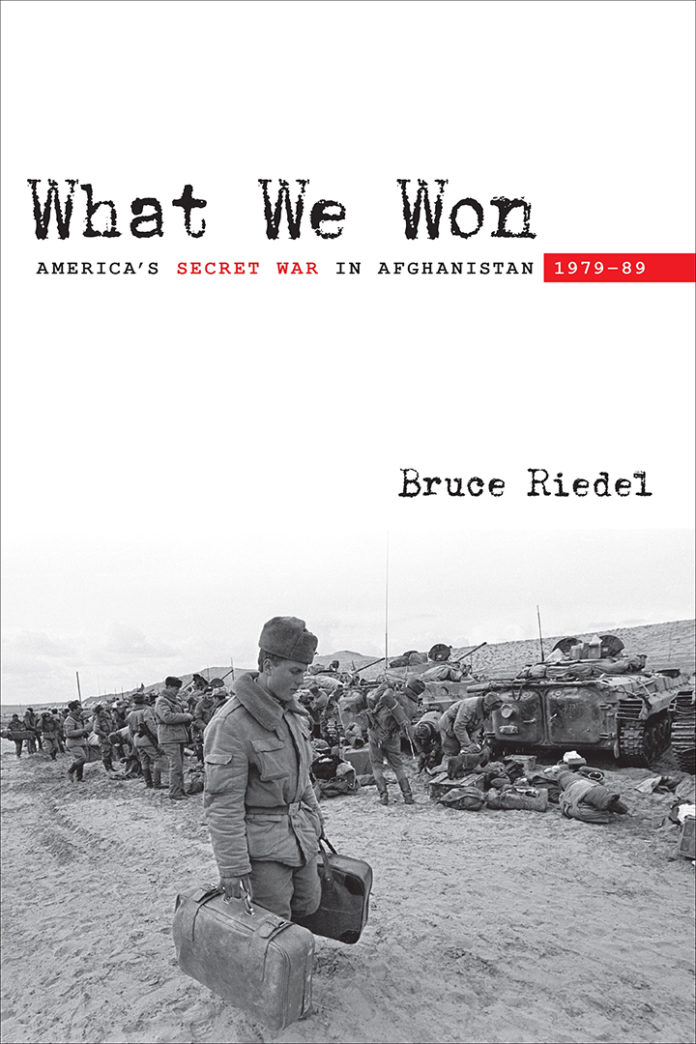Bruce Riedel’s book What We Won is brief history of Central Intelligence Agency (CIA) support of Afghanistan’s rebels in the 1980s. The book is divided into several chapters on major players of the last battle of the Cold War. The chapter on Afghan communists is very light with no serious inquiry about the background and evolution of the main leaders. The chapter on the Mujahedeen gives details of only two leaders, Jalaluddin Haqqani and Ahmad Shah Masud. There is not much written about Jalaluddin Haqqani and his biographic details are interesting. Initially, Pakistani handlers of Haqqani were not much impressed. He smelled so bad that one Inter Service Intelligence (ISI) officer put him in the bed of the pickup truck.
Bruce Riedel’s work describes the role of other players, especially Pakistan and Saudi Arabia in addition to CIA. He gives a sympathetic view about the Mujahedeen and is very critical of communist Afghan leaders. Afghan communist leaders were responsible for many horrible atrocities however but when compared to Mujahideen leaders they were patriotic, ideologically committed and not corrupt. A number of them occupied highest offices of government but were scrupulously honest: many didn’t even own a personal house and some like Muhammad Aslam Watanjar died penniless in exile. In comparison, all Mujahideen leaders lived in luxury in Pakistan, collected handouts from every foreigner and even today own huge assets outside the country and live in the most expensive neighborhood of Kabul.
Bruce Riedel has exaggerated the role of CIA which was quite overt and every shopkeeper on the streets of Peshawar knew about the sordid affair. Essentially, CIA bought Soviet made arms and ammunition from world’s arms bazaars and shipped it to Pakistan and provided satellite pictures to ISI for targeting inside Afghanistan. There is nothing extraordinary in the whole affair. In view of all the blowback and the hindsight of 20/20, Bruce Riedel tries to distance CIA and United States from the Mujahideen. He is happy to take the credit for CIA for defeating the Soviets in Afghanistan but all the fallout is conveniently put at the door steps of Afghans and Pakistanis. His Pakistani counterparts at ISI also try their best to distance themselves from CIA as the United States is a lightning rod in Pakistan. This helped both parties. In the aftermath of Church Committee hearings, CIA was very cautious to not get its own hands dirty. On the other hand, ISI wanted all the toys but no interference from finicky patrons. They were not much bothered by what later came to be known as collateral damage’ and everything was swept under the carpet of Jihad.
Riedel has also treaded gent! When elaborating the role of Saudi Arabia. He has personal acquaintance with the former head of Saud Intelligence, General Intelligence Directorate (GID) Prince Turki al Faisal and this may be the reason o skipping many details. He is absolving all parties of any wrongdoing and suggests that volunteers from Arab countries came because of the Soviet invasion and gives a clean chit to CIA, ISI and GID. I his view ‘Communism created the provocation’, ‘Zia ul Haq and King Fahad provided the venue and money to make Jihad a reality’ and Washington is white as snow. Saudi Arabia, Egypt and many other Arab countries shipped their own psychopaths to the killing fields Afghanistan with the hope that they would die there. Many demons survived the Afghan cauldron and came back and wreaked havoc in Algeria and Egypt and to a lesser extent in Yemen and Saudi Arabia. He considers any criticism of CIA of blowback from Afghanistan as ‘bad history’ and it is no surprise as some of his Pakistani intelligence counter parts call their Afghan adventure the will of God’. It is true that no human being can foresee third and fourth degree consequences of his actions. An average human being can predict first degree, an intelligent one second degree and a really gifted one can predict third degree consequences of any action. However, in most cases all bets are off after the first order and we all have to live with the good and bad consequences of our actions.
The author has conveniently omitted the ugly details of a brutal civil war and thus skipped the thorny question of complexities of patron client relationships. The mujahedeen started first to kill female teachers in schools and later male teachers and this was done in 1980s. A bomb was planted in Kabul University cafeteria killing and wounding students. The argument was that Communism is taught at the university therefore it was a ‘fair’ target. The Chinese provided portable single barrel rocket launchers to Pakistan. These rockets were passed on to the rebels for specific but indiscriminate targeting of Kabul city. There have been numerous notaries in the 1980s where Mujahideen lined up and shot people from villages and let God sort out guilty from the innocents. Some Afghan foot soldiers were uneasy and this practice bothered them. An appropriate religious edict (FATWA) was manufactured stating that for a good Muslim this world was like a jail cell and real and permanent life is in heaven. The reason was thus given that as intention of the perpetrator was good, therefore he was blameless. When he killed a group, there were only two types among the group – Communists and good Muslims. He will be rewarded once for killing the apostate Communist and second time for freeing a good Muslim from the jail cell of this world and sending him early to the permanent abode in heaven. CIA can claim that they are not responsible as they were not directly involved while Pakistanis can claim that they are not responsible for what Afghans did to their own countrymen.

It is interesting to note that General Zia ul Haq is remembered as responsible for all the negative fallout by most Pakistanis and William Casey held responsible for many transgressions including the Iran contra scandal by Americans. However, American intelligence operator has nothing but praise for Zia ul Haq and a Pakistani intelligence operator reciprocating the same sentiment for Casey. In Bruce Riedel’s view “General Zia ul Haq was the most significant strategist and risk taker in the epic battle with the Soviet army and his decisions were more important than Carter’s or Reagan’s”. One the other hand former head of Afghan Cell of ISI Brigadier Muhammad Yusuf in his book ‘The Silent Solder’ praises Casey. Yusuf states that, “It was a great blow to the Jehad when Casey died”. He did not elaborate whether by this definition one should count Casey as Shaheed (warrior who dies in a battle for the cause of Islam). It will be quite amusing for Americans to know that one of the former CIA director is actually a martyr of Islam. The rape of boys and women was used as an instrument of war by all Afghan war ring parties in Afghanistan. An Afghan young woman who had lived in the horrible days of 1990s in Kabul later married a non-Muslim man in United States. She told me that he was the first man in his life who gave her respect. The Mujahideen sexually abused prisoners of war and even had sex with mules imported from Australia. Casey, Reagan, Zia ul Haq and all Mujahideen leaders were deeply religious men and that reminds me of Blaise Pascal’s words that “Men never do evil so co cheerfully as when they religious conviction”.
The book is a good read basic understanding of the last battle of the Cold War. Bruce Riedel spent a long career at CIA and later headed the Pakistan desk a National Security Council and his last major assignment was strategic review of Afghanistan policy in 2009 for President Barrack Obama. After three decades, many additional details could have been added. In the modern days of Wiki Leaks, Edward Snowden and Intercept, the public is given a decent dose of real time covert operations. In these circumstances, keeping three decades old stories under wrap doesn’t serve any meaningful purpose.
Every player came on the ground with his own interests as well as his own rules for the game. The Afghan rebels used outside sources to reverse Soviet invasion as well as advance their own personal and political agendas, Pakistan’s military ruler used the situation to transform himself from a pariah-to a partner of a super power, Saudi Arabia used the opportunity to champion the cause of Islam in an effort to check mate new Iranian clerical rulers and United States, ever ready to fight another Cold war battle in someone else’s backyard and take sweet revenge for Vietnam humiliation.
‘Covert action is like a damn good drug. It works, but if you take too much of it, it will kill you’. Former CIA Director Richard Helms quoted in Bob Woodward’s Veil: The Secret Wars of CIA, 1981-1987.





